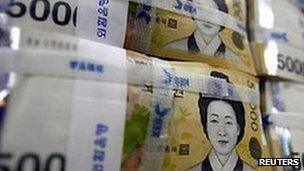S Korea in $15.3bn stimulus bid to spur economic growth
- Published

South Korea is the latest Asian country to try and boost economic growth by spending hard, unveiling a 17.3tn won ($15.3bn; £9.2bn) stimulus plan.
The funds will be used to help small and medium-sized exporters, create jobs, boost a stagnant property market and cover a shortfall in tax revenue.
South Korea has been hurt by weak exports and subdued domestic demand.
The move is expected to help boost annual growth by 0.3 percentage point this year and create 40,000 jobs.
"This is a much-needed move," said Kwon Young-sun, an economist with Nomura.
"It may not boost growth substantially but will help sustain the economy in the medium term amid the various pressures and challenges that it is facing."
Slowing growth
The move comes just weeks after the finance ministry cut the country's growth forecast for the current year.
It said it expects the economy to grow by 2.3% in 2013, down from its earlier projection of 3%.
The biggest drag on growth has been a slowdown in exports, which account for almost half of the country's total economic output. Shipments have been hit by weak demand in markets such as the US and the eurozone.
At the same time, recent fluctuations in currency markets have triggered concerns over a further slowdown in the sector.
The South Korean won has risen by nearly 10% against the US dollar since May, making its exports more expensive to foreign buyers.
A strong currency also hurts the profits of exporters when they repatriate their foreign earnings back home.
The main trigger for the gain in the won has been Japan's decision to massively boost its stimulus and spending plans. At the centre of its new policy has been achieving a weaker yen in the hope of boosting exports.
Japan's yen has dipped nearly 20% against the US dollar since November last year.
There are fears that because Japan and South Korea compete in similar markets, Korean goods may lose out as a result of the currency moves.
- Published24 February 2013
- Published28 March 2013
- Published11 October 2012